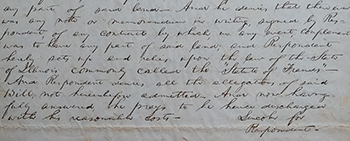May 2020 • Volume 108 • Number 5 • Page 42
Thank you for viewing this Illinois Bar Journal article. Please join the ISBA to access all of our IBJ articles and archives.
Lawyer Lincoln's Legacy
Lost Lincoln Real Estate Case Discovered
Details of the case, which included prominent McLean County figures, had been lost due to a 1900 Bloomington courthouse fire.

Abraham Lincoln was a hard-working practicing lawyer. He had an active office practice, but his emphasis was on trial work. He was involved in more than 5,000 cases at all court levels, ranging from collections to criminal law. Approximately one-third of those cases involved real estate title disputes. Most of Lincoln’s real estate cases were held in the Eighth Judicial Circuit. Recently, a previously unknown Lincoln Eighth Circuit case was revealed by an isolated Lincoln pleading I acquired and recently corroborated with the McLean County Circuit Court and county recorder records that had survived a devastating courthouse fire in Bloomington in 1900. At the time of this case, the circuit consisted of 14 counties in east-central Illinois.
The case, Jesse Funk v. Robert H. Rutledge, is a suit for specific performance in which Funk sought an order compelling Rutledge to convey 80 acres to him pursuant to an alleged contract of sale between the parties. Funk was represented by Asahel Gridley of Bloomington. Rutledge was represented by Amzi McWilliams of Bloomington, and Lincoln. Funk claimed the undisputed facts established a contract; Rutledge denied that there was a contract. Rutledge’s denial is set forth in the answer written in Lincoln’s hand. It is a page and a half on legal-size paper and signed simply, “Lincoln for Respondent.” It is the only pleading in the case that survives. The subject of the litigation was 80 acres, in Downs Township, on the south edge of McLean County. The presiding judge was David Davis, the only circuit judge for the entire Eighth Circuit.

Davis had come from Massachusetts in 1836, eventually finding his way to Bloomington, where he practiced law until he was elected circuit judge in 1848. He and Lincoln were quite close and frequently roomed together on the journey around the circuit. However, none of the circuit’s lawyers ever expressed concern or worry that the relationship would affect Davis’s handling of Lincoln’s cases. Lincoln often stayed in Davis’s home in Bloomington, Clover Lawn, which was located at the site of the present mansion built in 1872. It is now a state historic site overseen by the Illinois Department of Natural Resources. Davis was not only an important figure in Lincoln’s legal career, he was the principle architect of Lincoln’s rise to the presidency in 1860. Lincoln rewarded his efforts by appointing Davis to the U.S. Supreme Court, where he served until he resigned in 1877 to run for the U.S. Senate. He served in the Senate until 1883. He was elected president of the Illinois State Bar Association in 1884.
Dispute over 80 acres
The parties to the litigation, Funk and Rutledge, were both natives of Kentucky and settled in McLean County in 1824 and 1826, respectively. It was then essentially wilderness with minimal settlement. They settled in the southern portion of the county, an area then part of Fayette County. This changed when McLean County was formed in 1830, incorporating both their residential locations and the land that was the subject of this lawsuit. Funk was a brother of Isaac Funk, who was to become one of the most influential settlers in McLean County history. Jesse Funk eventually acquired some 2,250 acres before his death. Rutledge, who acquired less land during his lifetime, was highly respected and one of the earliest settlers in that portion of the county. His father, Thomas, was the brother of James Rutledge, cofounder of New Salem and father of Ann Rutledge, forever immortalized because of her reputed romantic relationship with Abraham Lincoln that ended tragically with her death in 1835.
The subject of the litigation was title to the 80-acre tract. Much of the land in central Illinois was still titled in the United States at this time. In order to gain title, a potential buyer went to the U.S. Government Land Office when lands were announced to be sold. The successful bidder for a tract received a land warrant, which entitled the holder to receive a patent deed to the land, or the purchaser of the warrant could assign it to another party who would seek title. Funk and Rutledge travelled to the Central Illinois Land Office in Danville where Alfred J. Stiles assigned a land warrant, which he had purchased for 160 acres, to Rutledge. In turn, Rutledge received a patent deed for the two 80-acre tracts covered by the warrant. The deed was executed in the name of President Millard Fillmore on March 1, 1851. Thus, Rutledge owned the 160 acres when the suit was filed by Asahel Gridley on behalf of Funk. While the pleadings—other than the surviving Lincoln answer—and orders were destroyed by the 1900 fire, the record book of documents containing the particulars of the case survived. The price for the warrant and land was $175. It was paid by two notes, each in the amount of $87.50. Funk and Rutledge each signed the notes. Funk claimed he was therefore entitled to half of the land: 80 acres. To reinforce his claim, he tendered a note for $87.50 and demanded a conveyance. When Rutledge refused, the suit was filed. As set forth in Lincoln’s surviving answer, Rutledge’s response was that Funk had only signed the notes as surety and therefore denied the title claim.
There is no mention in the surviving records of any contract document. This explains Lincoln’s defense set forth in the answer, which was the statute of frauds, asserting that there was no written contract. Funk’s position was that the notes, which were writings signed by both parties, constituted the required written agreement.
Funk prevails
In the 1850s, circuit courts met for a term in the spring and in the fall, with the judge travelling from county to county for the consecutive court sessions. Lincoln’s answer was filed during the September 1851 term, so the case was continued to the next term in April of 1852. Funk then requested a continuance to September 15, 1852, when he requested another continuance to April 1853, when the case was tried.
Court records do not recite any detail of the hearing, which was held on April 19, 1853. Judge Davis took the case under advisement until September. On Sept. 13, 1853, the attorneys appeared and the court entered an order stating, “It is by the agreement and consent of both complainant, Jesse Funk, and the defendant, Robert H. Rutledge, which agreement and consent are now made in open Court.” The parties agreed that each would obtain one-half of the land in issue, specifying which two 40-acre tracts would be conveyed to Funk. The order provided that Funk was entitled to half the land and Rutledge was to execute that conveyance within 30 days. Funk was to bring the payment for the land into court to be paid to Rutledge in the amount of $87.50, together with interest from Jan. 31, 1851, in the amount of $13.78, for a total of $101.28. The payment was also to be made within 30 days. This order appointed William McCullough, as commissioner, to execute a deed to Funk for the 80 acres specified in the order if Rutledge refused to sign the deed. The payment to Rutledge was to be made through McCullough in that event. The order concluded by indicating that each of the parties should pay one-half of the cost. McCullough had served the county previously as sheriff and was serving as circuit clerk at the time of the order.
Apparently, Rutledge failed to sign the deed, so McCullough carried out the direction of the order, signing a deed that conveyed the specified acreage to Funk. The deed was filed and recorded on Dec. 15, 1853. The conveyance, as with the 1851 conveyance to Rutledge, is set forth in the record books of the Recording Division of the McLean County Clerk. On April 10, 1854, McCullough filed his report advising that he had received the payment from Funk and paid it over to Rutledge. The order of Sept. 13, 1853, also allowed five dollars to McCullough for the services rendered by him. The final entry in the case was the report of McCullough and the judge’s order on April 10, 1854.
Gridley’s client, Funk, was successful. He obtained the 80 acres that he had sought in the suit. Lincoln’s client, Rutledge, retained the remaining 80 acres and received the payment from Funk.

Guy Fraker is a retired lawyer from Bloomington and the author of two books, Lincoln’s Ladder to the Presidency: The Eighth Judicial Circuit, and Looking for Lincoln in Illinois: a Guide to Lincoln’s Eighth Judicial Circuit.

